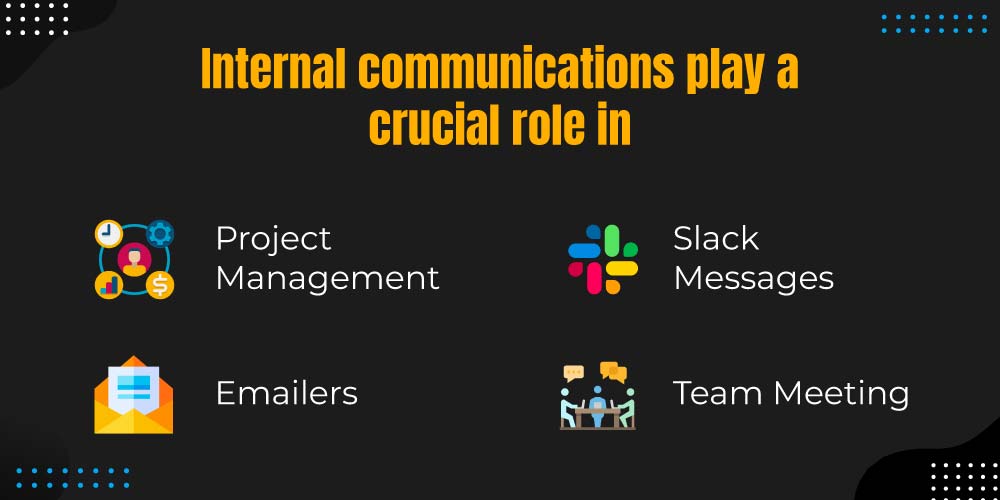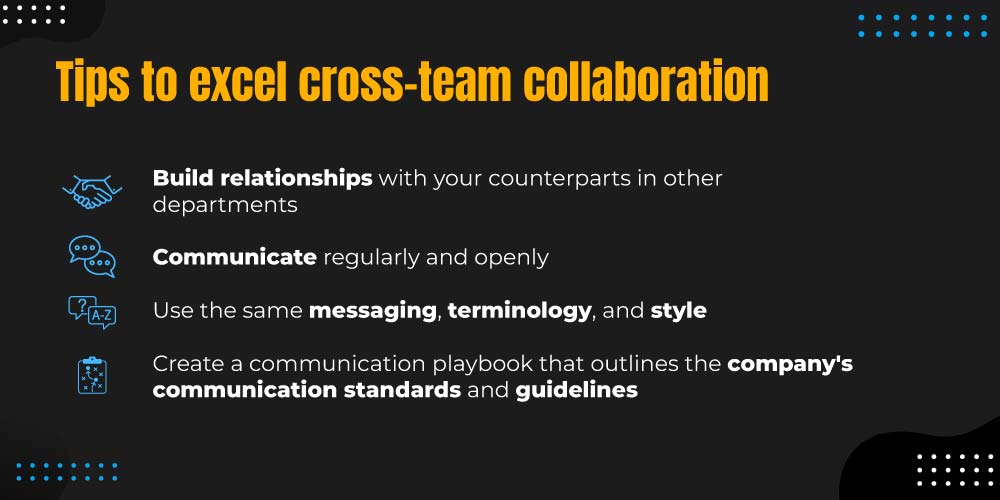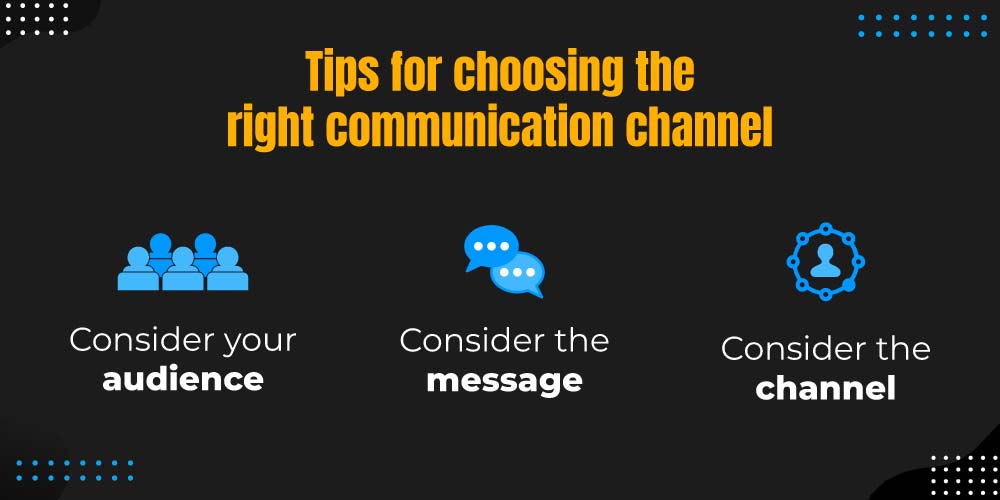Acing Internal Communication: 5 Tips for Better Job Growth
Did you know that 85% of employees say that internal communication is important to their job satisfaction?
Yet, many companies struggle to communicate effectively with their employees.
And this goes around as well. Employees who are effective communicators are 4x more likely to be promoted than those who are not.
Well in this blog post, we will reveal the secrets to acing internal corporate communication and boosting your career. You’ll learn how to be a clear and concise communicator, an active listener, transparent and honest, a team player, and use the right tools and channels.
Why do you need to read this?
This blog post will provide you with the tools and knowledge you need to become an effective internal communicator. You’ll learn how to:
- Write clear and concise emails and presentations
- Communicate effectively with colleagues one-on-one
- Be an active listener
- Be transparent and honest with employees
- Collaborate with other departments
- Choose and use the right tools and channels for internal communication
- Example references of different formats of effective communication.
So, by following the secrets in this blog post, you can ace internal corporate communication and boost your career.
Tip #1: Be a clear and concise communicator
Imagine a scenario where a manager sends out a vague email to their team, simply stating, “Please complete the project by the end of the week.” The team members are left unsure of what the specific tasks are, what the deadline for each task is, or who is responsible for what. This lack of clear and concise communication can lead to misunderstandings, errors, and missed deadlines.
Another example is when a presenter gives a presentation that is poorly organized and full of unnecessary jargon. The audience is left confused and disengaged, and they may not even understand the main point of the presentation.
Clear and concise communication is essential in the workplace because it helps to:
- Reduce misunderstandings and errors
- Save time and resources
- Improve collaboration and teamwork
- Build trust and rapport
- Increase employee engagement and productivity
- Create a more positive and productive work environment


Internal communications play a crucial role in:
- Project management: Clear and concise communication is essential for the success of any project. Project managers need to be able to communicate effectively with team members, stakeholders, and other stakeholders to keep the project on track and avoid any surprises.
- Emailers: Email is one of the most common forms of communication in the workplace. It is important to write effective emails that are clear, concise, and easy to read.
- Slack messages: Slack is another popular communication tool in the workplace. It is important to use Slack effectively by sending clear and concise messages and avoiding sending too many messages at once.
- Team meetings: Team meetings are a great way to share information, collaborate on projects, and solve problems. Whether it’s a one-to-one or a group meeting, It is important to keep team meetings focused and productive by having a clear agenda and sticking to it.
Tip #2: Be an active listener.
Ever happened that you’re talking to your manager, or a team member, explaining something that is important- maybe a new project idea for which you are very excited and enthusiastic about? But the person seems distracted and not really paying attention to you. They interrupt you frequently and don’t ask any clarifying questions. When you are finished talking, they simply say, “Okay, sounds good.” You leave the meeting feeling disappointed and frustrated.
We all have been at that point in our lives.
This is a common scenario that happens all too often. Many people think that listening is simply hearing what the other person is saying. But listening is much more than that. It is about paying attention, understanding the other person’s perspective, and responding in a way that shows you are engaged.
Why is it important to listen attentively?
Being an active listener is important for a number of reasons. First, it helps to build trust and rapport with others. When people feel like you are listening to them, they are more likely to trust you and be open with you. Second, active listening can help to avoid misunderstandings and disagreements. It helps in the following ways:
- Improved communication: Active listening can help to improve your communication skills by making you a better listener.
- Stronger relationships: Active listening can help to strengthen your relationships with others by making you a more supportive and understanding friend, colleague, or family member.
- Reduced stress: Active listening can help to reduce stress by helping you to better understand and manage difficult situations.
Tip #3: Be Transparent and Honest
If you’re a manager: Keep your colleagues informed of changes and developments within the company. If you’re a team player: Ensure transparent POA items are served, and any minor differences are shared and dealt with accordingly.
Transparency is important in the workplace for a number of reasons. It helps to build trust and rapport, improve communication, and reduce uncertainty. When employees feel like they are being kept in the loop, they are more likely to be engaged and productive. They are also more likely to trust their managers and the company as a whole.
How to implement transparent working within your team?
- Be open and honest with your team members. Share information about the company’s goals, strategies, and challenges. Be honest about your own mistakes and shortcomings.
- Encourage team members to ask questions. Create an environment where people feel comfortable speaking up, even if they have different opinions.
- Be transparent about decision-making. Explain the rationale behind your decisions and give team members the opportunity to provide feedback.
- Celebrate successes and learn from failures. Be transparent about both the good and the bad. Share what went well and what could be improved.
Let’s have a look at a few real-world examples:
- Hold regular team meetings to discuss progress, challenges, and upcoming projects.
- Share company news and updates via email or intranet.
- Be honest about the company’s financial situation, both good and bad.
- Be open to feedback and suggestions from team members.
- Admit your mistakes and apologize when necessary.
Tip #4: Be a team player
Collaboration with other departments is essential for effective internal communication. When different departments are working together, it is important to ensure that their communications are aligned. This means using the same messaging, terminology, and style.
There are a number of ways to ensure that communications are aligned across departments. One way is to hold regular meetings where representatives from different departments can discuss their communication plans and share feedback. Another way is to create a communication playbook that outlines the company’s communication standards and guidelines.


Tips for excel cross-team collaboration
- Build relationships with your counterparts in other departments. Get to know them and their work. This will help you to understand their needs and perspectives.
- Communicate regularly and openly. Share information about your upcoming projects and initiatives. Be open to feedback and suggestions from others.
- Use the same messaging, terminology, and style. This will help to reduce confusion and ensure that everyone is on the same page.
- Create a communication playbook that outlines the company’s communication standards and guidelines. This will help to ensure that everyone is communicating in a consistent and coordinated manner.
Being a team player, it is also important to understand the importance of feedback mechanisms. In the process of giving and receiving feedback, it becomes essential to showcase support and understanding.
Here are some tips for being open to feedback:
- Listen carefully to feedback. Don’t be defensive or argumentative.
- Ask clarifying questions to make sure you understand the feedback.
- Thank the person for their feedback.
- Take some time to reflect on the feedback and consider how you can use it to improve.
Tip #5: Use the right tools and channels
When communicating with colleagues, it is important to choose the right channels for your audience and message.
For example, email is a good channel for communicating complex messages or messages that need to be documented. Slack is a good channel for quick and informal communication. Microsoft Teams is a good channel for collaboration and teamwork. Face-to-face meetings are a good channel for building relationships and discussing complex or sensitive issues.


Tips for choosing the right communication channel
- Consider your audience. Who are you communicating with? What is their preferred communication style?
- Consider the message. What is your message? Is it simple or complex? Is it urgent or not urgent?
- Consider the channel. What are the strengths and weaknesses of each channel?
In one instance, technology can be a great tool for internal communication. It can help to connect employees from different locations and make it easier to share information. However, it is important to not forget the importance of face-to-face communication. Face-to-face communication is essential for building relationships and trust.
Creative Communication is better understood
Don’t be afraid to be creative and innovative in your communications. There are many ways to communicate with your colleagues. Here are a few ideas:
- Use storytelling to communicate your message. Stories are more engaging and memorable than facts and figures.
- Use visuals to support your message. Images, videos, and infographics can help to make your communication more effective.
- Use humor to make your communication more engaging. However, be careful not to use humor that could be offensive or inappropriate.
Conclusion
In conclusion, mastering internal corporate communication is pivotal for career growth and job satisfaction. Let’s unravel five essential tips to elevate your communication skills within the workplace.
Firstly, being a clear and concise communicator is crucial, as it reduces misunderstandings, saves time, and fosters collaboration. Effective communication is integral in various aspects, including project management, emails, Slack messages, and team meetings.
Secondly, active listening is emphasized as a key skill. It builds trust, strengthens relationships, and reduces stress, contributing to improved overall communication.
The third tip advocates for transparency and honesty. Whether you’re a manager or a team player, keeping colleagues informed and creating an environment for open communication is vital for building trust and engagement.
Collaboration across departments is the fourth tip, stressing the importance of aligning communications through regular meetings, shared feedback, and a communication playbook.
Finally, using the right tools and channels is highlighted. Considering your audience, message, and the strengths of each communication channel ensures effective and targeted communication. Additionally, creativity, storytelling, visuals, and humor are encouraged to enhance engagement while being mindful of appropriateness.
By incorporating these tips into your communication strategy, you can not only ace internal corporate communication but also propel your career forward. Remember, effective communication is not just a skill; it’s a career asset that sets you apart in the professional landscape.







